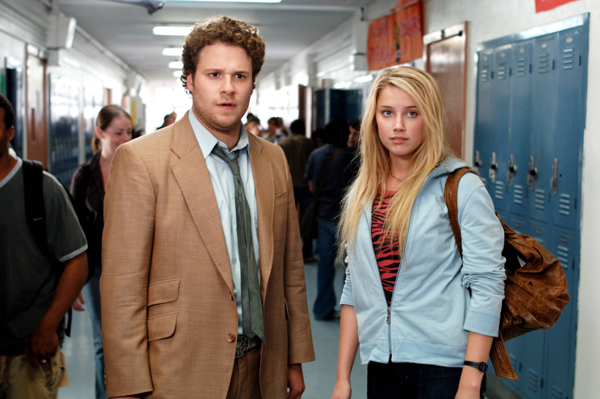Movie review by Greg Carlson
“Pineapple Express” will win plenty of stoner fans looking for an easy good time, but considering some of the creative team’s recent work, the formulaic movie stumbles too often to be recommended. Writers Seth Rogen and Evan Goldberg, under the producing tutelage of Judd Apatow, delivered last summer’s surprise comedy hit “Superbad” after dusting off a screenplay the duo penned when they were teens. “Pineapple Express,” despite a story assist from Apatow, practically reeks of the same vintage, and the movie works as a virtual companion piece to the earlier film. Indie auteur David Gordon Green seems like an inspired choice for the driver’s seat, but with the exception of a golden-hued interlude involving a game of leapfrog, little of his signature directorial style makes it to the screen.
Rogen takes a meatier onscreen role this time out, playing protagonist Dale Denton, a perpetually baked process server whose career choice facilitates getting high on the clock and frequent visits to the high-school attended by his girlfriend. Pot dealer Saul Silver (James Franco), a lonely, pajama-clad waster desperate for human intimacy with his best customer, likes Dale so much he breaks out the rare strain of the title, hoping that the potent offering will lead to that special bond now familiar to Apatow fans under the portmanteau “bromance.”
“Pineapple Express” starts with plenty of promise, and director Green smoothly embraces the principal pair and their lived-in milieu. The agenda of the filmmakers takes a dark and dreary turn, however, as Dale witnesses a murder that brings a large measure of mayhem down on his previously idyllic haze. Yes, the ridiculous bursts of over-the-top bloodshed and physical violence are intended as a parody of self-consciously hip capers of the Tarantino variety, but the predictability factor only cranks up the level of tedium. “Pineapple Express” needed to capitalize on the chemistry of the lead actors instead of stage protracted shoot-outs and fisticuffs involving Asian drug gangsters (stereotypes?) and loquacious, sensitive hit-men.
Undoubtedly, all of these arguments are void if one views the movie under the influence of mood-enhancing substances, and it is a relief that Franco’s Saul is so wonderfully, lovably pathetic. Franco steals every scene, which is no mean feat when pitted against the criminally hilarious showboater Danny McBride, whose unfailingly polite double-crosser ad-libs some very funny material. Like “Superbad,” “Pineapple Express” hits its stride when exploring the fragile insecurities of its heroes. After what seems like an eternity of ghoulish ear trauma and abdominal gunshot wounds, the movie arrives at a rather sweet diner conversation in which the fellows share their hopes and dreams.
Dale’s vaguely inappropriate relationship with the teenage Angie (Amber Heard) is played for laughs – not that we need reminding that this guy refuses to grow up. The whole girlfriend subplot, which periodically hints at a more interesting movie than the one you are watching, crashes and burns following a terrific nightmare dinner-with-the-parents riff featuring Ed Begly Jr. and Nora Dunn (who both just show up, blow the doors off their big scene, and then essentially disappear). Inexplicably, the script stashes Angie in a hotel room where she suffers the fate – inelegantly described as “bros before hoes” – pre-ordained by ultimate buddy movies: there is no time for girls when close pals have (un)important things to do.
